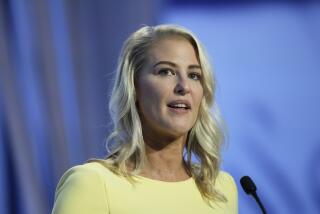Couple Who Founded Banana Republic Resign From Company
- Share via
SAN FRANCISCO — Mel and Patricia Ziegler, the husband-and-wife team who abandoned journalism to bring theater to retailing by founding the Banana Republic chain of safari and travel clothing stores, resigned Wednesday as president and executive vice president of the company.
The Zieglers cited “fundamental creative and cultural differences” with the new management installed last month by Banana Republic’s corporate parent, Gap Inc. The Zieglers sold their two-store company to Gap in 1983 but continued to run it autonomously until last month when Gap president, turnaround artist Millard (Mickey) Drexler, also was named chief executive of Banana Republic.
Since Gap acquired the business, Banana Republic has grown rapidly into a chain of 99 stores crammed with bush planes, Jeeps, thatched-roof huts and phony giraffes and elephants--and lots of cotton khaki and other natural fiber clothes. But competition and sluggish sales caused Gap to cut back 1988 expansion plans to 15 new stores from the 25 originally contemplated.
“Their growth has stalled due to widespread copycatting,” said Thomas H. Tashjian, a retailing analyst at Seidler Amdec Securities in Los Angeles. He cited the Limited’s Safari line of clothing, Charming Shoppes’ Kenya collection and “the khaki look at department stores around the country.”
Tashjian said that while the Zieglers were “strong contributors” to Banana Republic’s early success, today’s more competitive environment requires “the experienced hands of a professional merchant” at the helm.
Drexler may fit the bill. He is widely credited with breathing life into Allied Stores’ staid Ann Taylor division as president before joining Gap in 1983. There, he broadened the jeans chain’s offerings to include more upscale and casual clothes for yuppies.
Though Drexler wasn’t available for comment, that may be his strategy, too, at Banana Republic, which until recently has focused on its trademark safari look. His first major hire, announced last week, was Ralph Lauren’s vice president for creative design, Tasha Polizzi, who will have the same position at Banana Republic, but will work from New York rather than San Francisco headquarters.
Drexler also killed the Zieglers’ lavishly funded pet project, Trips magazine, which debuted to mixed reviews earlier this month and whose second issue was about to go to press. The offbeat travel magazine was an outgrowth of Banana Republic’s award-winning catalogue.
Neither the Zieglers nor the Gap’s chairman, Donald Fisher, would comment on the creative differences that led to the split, and Fisher was generous with his praise. The Zieglers, he said, “built a very intelligent and fun business that brought touches of theater, art, humor and literature to retailing and mail order.”
Said the Zieglers: “Our marriage to the Gap allowed us to take our concept further and faster than we ever imagined. We never expected to stay forever. It’s time to get on to something new.”
After years of dizzying growth, Gap stumbled in its fourth fiscal quarter, which ended Jan. 31, when net income fell to $21.7 million from $28.2 million a year earlier. Fisher, in an interview Wednesday, said profits were hurt by discounting; sales in the period rose to $360 million from $299 million.
He said business in the current quarter is “nothing great. It’s OK. It’s decent.”
Mel Ziegler, now 43, met Patricia, 38, when he was a reporter and she was a courtroom artist for the San Francisco Chronicle. In the late ‘70s, they quit their jobs to travel the world, and received so many compliments for a bush jacket Patricia had fashioned for Mel that they decided to open a store.
Their first store, in Marin County’s Mill Valley, was a cluttered former head shop “that was just funky enough to dictate the look and feel of what Banana Republic was to become,” a former associate said Wednesday.
“It was very ‘70s,” the former associate added. The Zieglers’ departure from the company--seemingly prompted by pressures on the corporate bottom line--seemed very ‘80s.
More to Read
Inside the business of entertainment
The Wide Shot brings you news, analysis and insights on everything from streaming wars to production — and what it all means for the future.
You may occasionally receive promotional content from the Los Angeles Times.









